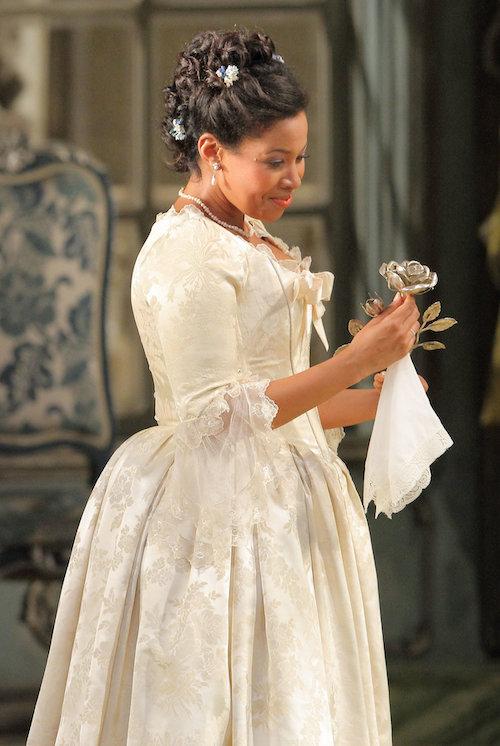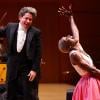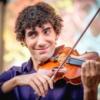
She was on her way to becoming an investigative journalist at Rhodes University in Grahamstown, South Africa, when she took a music class and stumbled upon a recording of Die Fledermaus featuring Kiri Te Kanawa. Journalism’s loss became a huge win for classical music, as soprano Golda Schultz continues her meteoric rise. Now 38, the singer is performing during the season opener of the Los Angeles Philharmonic (Oct. 14–17) in a program featuring Schoenberg and Strauss led by music director Gustavo Dudamel.
Schultz, who’s made her home in or near Munich since 2011, was not raised in a family of trained musicians, but after becoming enamored with opera, pursued a graduate degree in music at the University of Cape Town. Also spending two years with the Cape Town Opera, she later auditioned and was accepted to train at New York’s Juilliard School and Bayerische Staatsoper’s Opernstudio, the latter preparing the young vocalist for an international career.
And what a career it’s been: Internationally hailed as one of today’s most talented and versatile artists, with London’s The Guardian writing, “it’s hard to imagine a finer soprano singing,” and The Financial Times declaring, “Golda Schultz sings with strength and assurance, her voice with its own distinctively thrilling radiance; she is a newcomer who simply has everything.”
Everything, it would seem, and then some. Schultz made her Metropolitan Opera debut in 2017 as Pamina in The Magic Flute, and appeared at the Glyndebourne Festival Opera in 2016 as Countess Almaviva in The Marriage of Figaro, a role she reprises at The Met in January, 2022. Schultz again takes to The Met stage as Anne Trulove in Stravinsky’s The Rake’s Progress next May.

Not for nothing did opera writer Fred Plotkin name Schultz as one of the “40 Under 40 Singers” in 2018. As for concerts and recitals, Schultz also operates at a high-octane pace: The soprano was featured soloist at the Royal Albert Hall in the Last Night of the BBC Proms in 2020, a program broadcast live on radio and television to a global audience of millions. Other recent highlights include a week with the LA Phil in 2019, when she joined Esa-Pekka Salonen, Dudamel, and Zubin Mehta on stage to commemorate the orchestra’s centennial. A dedicated recitalist, she and pianist Jonathan Ware gave a 2019 concert at Carnegie Hall, with upcoming performances in Philadelphia and San Francisco.
I caught up with the energetic singer by phone in Germany, where we discussed a number of subjects, including what’s in a name, her abiding admiration for Dudamel, and taking a deep dive into her upcoming gig with the band.
How did you fare during the pandemic and how great does it feel to be in front of a live audience again, which you’ve described as “having a soul conversation between the audience and the performer?”
I was one of the fortunate few that still got to do performances. In Germany, we had a lot of online performances and now, as things are starting to open up and more people are going back to theaters and concerts halls, it’s special to look out into a space and see faces looking back into you. It’s what we got into the business of musicmaking for — feeling music vibrate not only in your own body, but how it vibrates with everybody else.
I understand that your mother named you Golda after Israel’s prime minister, the late Golda Meir.
She did. It wasn’t a political thing; it had more to do with the fact it was a woman that had been elected to be in charge of a country, in charge of people. She thought it was such a strong ideal, and for my mother, she’s had this philosophy that children should grow into their names and names should inspire them. It wasn’t her politics, as I said, but more for the fact that a woman stood up in a field of men and said, “I want to be counted.” Your name is your talisman and she was trying to give me a strong talisman to hold onto.

You toured Mahler’s Symphony No. 4 with Dudamel and the Mahler Chamber Orchestra in 2018. What was that like to perform under his conducting?
It was my first time working with Gustavo — and getting to work with the Mahler Chamber Orchestra that was founded by [Claudio] Abbado, knowing their legacy and his reverence for his music. It was so special — coming into a conversation already in progress and getting to add to it.
I never consider myself an expert in any piece of music I do. I come in willing to listen to other peoples’ ideas and interpretations, mull it in my brain and then add another question to the conversation. What I appreciate about Gustavo is that he responds to that so well — that curiosity from my fellow musicians and gaining confidence with my artistry through his support. I just feel really, really blessed for that experience.
I know that Dudamel doesn’t use a score much of the time, especially with Mahler. Was that the case on this tour and what about you?

I had told him, “I’m sorry but I don’t trust myself without music.” I was using a study score the size of a little novella and following the entire orchestra. There was one part when he asked during rehearsal, “What bar are we on ... I was just checking that you’re listening.” He would also say, “You know you know this, right? You never look at the music, you just sing, but if you need that, I support you.”
And I would say, “Oh, no, I don’t feel comfortable.” We toured that piece for two weeks and every day we were rehearsing. In the third concert I slowly started with the score and lowered it when I was singing. In the next concert I put it on the seat behind me and by the last concert I was fully in the moment with him — both of us were working from memory. We trusted we had all worked it out together — having that feeling of, “I’ll catch you wherever you fall.” I’m not sure I would risk that with the Four Last Songs, though.
What a perfect segue, as I want to ask you about your approach to singing Richard Strauss’s Four Last Songs, which you’ll be doing with the LA Phil.
They are a pinnacle and something to aspire to as a soprano. Once you start singing Four Last Songs, these are songs that are with you for a long time. The way you sing them at the beginning won’t be the same as at the end. I started listening to the songs — my favorite recordings are [those of] Lucia Popp and a Finnish soprano, Soile Isokoski.
I start with the poems themselves — with the imagery. Then I listen to orchestra harmonies, then I read the poems while they’re being sung. I’m not learning only how to sing them, but hearing how Strauss heard the words, how he envisioned the text, what the text implied to him, knowing where he was at that time of his life. Where he might have been sitting after a walk in the woods in the Bavarian mountains, sitting at his desk, knowing that this is his process.
Strauss was surrounded by nature and the idea of spring coming. He would see that and how spring comes into a garden — how summer leaves a garden. My favorite is the Third, the lullaby [“When I Go to Sleep”], which for me, it’s such perfection knowing that this is his meditation on a life well-lived. Knowing that he wrote this at the end of his life, knowing that there were more things behind him than ahead of him. And that’s okay. Endings are a part of the whole. Endings are the moment before a new beginning.
There’s something profound in that acceptance. Like COVID, where so many people fought hard at the end, when some people haven’t been given an opportunity to say goodbye. Songs like this give you comfort. It’s okay to leave when you leave, even if the journey feels completely unfinished. The journey still was, and that’s worth celebrating. I’m a real nerd about that.
You may think of yourself in nerd terms — I certainly don’t — but loss is universal, making these songs especially evocative at this particular moment.
In my family, we’ve experienced a lot of loss, but I have always found music has helped me to grapple with loss. After COVID there was so much to grapple with. When I started reading these poems, I started to cope. The music helped me and that’s how I knew that, well, if it helps me just a little bit, maybe it helps someone a little bit more to hear it. I know for a fact that the Phil and Dudamel, that’s the perfect way to start the journey and I’m grateful.
You must get asked this all the time, but I thought I’d give it a shot: As a woman of color, what are your thoughts on the question of diversity in classical music?
I think diversity is necessary. Biologists will tell you that biodiversity in nature is necessary, otherwise we don’t thrive. The same is true in other systems, where we are dependent on each other. In classical music, of course the same understandings of text, harmonies, form, will not go forward without diversity, and classical music will be relegated to a museum and only be heard in a museum. Mozart, Strauss, Wagner or Monteverdi, who wrote for the living voice, they would never want us to not be diverse. That’s not living.
Classical music needs to live in society. I mean us, the people who make the music, who write the music, experience the music, we live in a different world [than the composers] and music should reflect that world. We should be able to be given space where we stand. Whenever you pick up a piece of music, you find yourself in the middle of a conversation and your only job is to add to the conversation. That’s the job.
The only way classical music can become a conversation about music, then, is it needs diverse voices fighting about meaning. What does this all mean to us? How can Mozart have more meaning for us where we are now? How can we invoke more meaning in Verdi’s Luisa Miller, in Bellini’s I puritani? Looking at this conversation between text, song, prose, and music — how can we add to that conversation or is that conversation over?
So many levels of diversity are required. Not just diversity of looks, but thought. And not just one answer fits all. That’s where the good part of the work is — the looking, the searching for what you consider to be the opposing force — that will make it stronger. I love to talk about things that matter. If people want to hear my opinion on something that matters to me, I always do my best to answer with kindness. I don’t pretend to know any of this, but this is how I try to live.





